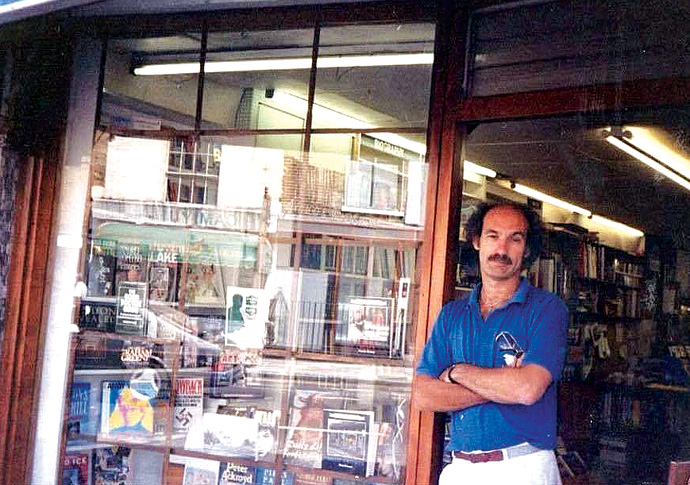‘Booky' chapter in Parkway's history
Dan Carrier potters down a currently quiet memory lane in Camden Town
Friday, 17th April 2020 — By Dan Carrier

STELLA waited tables at Goodfare in Parkway, and was so notorious for her manner the place became known after her. Apparently the proprietor didn’t like that much, but he drove a Ferrari, so was doing pretty well.
Back in the 1960s, when Stella was in charge of the restaurant on the corner of Parkway and Arlington Road, there were many empty shop fronts. The real business was conducted behind the facades in industrial warehouses and yards.
Peter Bergman set up Regent’s Bookshop towards the top end in the early 1960s. It occupied a space 15 feet across.
He often breakfasted at Goodfare and eventually won over Stella, who became a friend. But it took time.
“Stella was incredibly hard work – she used to throw the food at you. If someone came in at lunchtime and ordered a cup of tea, she’d chuck them out.”
Peter’s stepfather, Jack Elmont, ran a book and magazine wholesalers from a warehouse along Parkway called Burmont Books.

Peter Bergman outside Regent’s Bookshop
“I was always very booky,” recalls Peter. “I said to my old man ‘I’ll come work for you if you let me open up a book shop in the front.’
“We sold cigarettes, sweets and magazines – anything to improve the footfall.”
A couple of years in, the landlord offered to sell for £7,000.
“We weren’t sure it was a good idea – it was only held up by the houses either side,” he says. “My stepfather said: ‘why on earth would I want to buy a place in Camden Town?’ But my mum persuaded him.”
Gradually, the wholesale business dropped off so they extended the bookshop. The sundries disappeared, too.
“At the time, it might have been quite mad to open,” he says. “It was a working-class area and that end of Parkway was very quiet. I had no idea who would come in.”
On one side was Roberson’s art shop, which supplied Walter Sickert and the Camden Town Group painters with materials. On the other, the Boggi family ran the Parkway Café.
“The Boggis were the first people I met,” Peter remembers. “It was a greasy spoon – very successful, always busy.”
Founding grandfather Paolo had been a cook in the Italian Army during the war, and in 1943, when the Italian government collapsed, he walked for a week at night through forests and mountains to get back to his Tuscan village. He spent 18 months in hiding.
In 1947, Paolo moved to London with his wife Virginia and by the late 50s were running the Parkway Café, which became Trattoria Lucca.
The Boggis closed in 2014. Paolo, who still lives upstairs, celebrates his 100th birthday in May.
Opposite was Gordons, a camera store, and Harvey Johns – a toy shop next to the cinema that had an impressive display of Subbuteo teams. Children, queuing up to get into the pictures, would press their noses against its colourful windows.
Next to the Dublin Castle was Leon the Greek grocer – full of fresh produce and exotic goods like olive oil, taramasalata and freshly baked pitta bread.
The Jazz Cafe was a Barclays bank, while further up, in the late 1960s, trendy boutique Du Du opened – a precursor of today’s Camden Town. The steel band hired to announce their opening caused a stir – as did their choice of exterior signage.
“The woman who ran it was a hippy,” says Peter. “They had the outside done by the same people who did the Beatles’ headquarters in Baker Street. They painted a phallic symbol up the length of the building with stars shooting out the top. We all had a good giggle.”

Alan Bennett
But it was, he says, very much a working street serving the needs of those who lived nearby.
The advent of the Gloucester Crescent set – Jonathan Miller, Alan Bennett, George Melly and others who moved in cultural circles – translated into sales.
“I didn’t have a lot of customers, but the ones I had were very good,” he says. “Jonathan Miller would buy so many books he couldn’t carry them home – I’d have to walk them round.”
Novelist Beryl Bainbridge, who lived in Albert Street, would drop in. When Peter first met her she was unpublished and worked sticking labels on wine bottles at Baloneys, a bottle factory, opposite the Spread Eagle pub.
“She would do her Christmas shopping with us. We had a tradition – I would deliver her presents on Christmas Eve, after I’d shut for the holidays. I’d stop in for a glass of something.”
Another quiet browser was always covered in paint. Peter thought he was a decorator – until he saw a documentary about the Venice Biennale and realised it was the artist Frank Auerbach.
David Thomson, the author of In Camden Town, was charming, while Alan Bennett used to hide behind shelves from other customers to avoid making polite conversation.
Bennett’s famous “Lady In the Van”, Miss Shepherd, was less welcome.
“Alan could see people differently than the rest of us. Now she is an icon – but she was horrible.
“I had a very long stand-off with her. I wouldn’t let her in because she would hassle the customers and she smelt terrible.
“She would chalk religious drawings on the pavement and demand money off anyone who walked past. Sometimes she just did it to be awkward.”
Regent’s Bookshop closed in 2005. Peter had previously opened at midnight to sell the latest editions, with keen customers queuing up. But when JK Rowling’s novels had reached their fourth instalment, supermarkets sold them for £5 less than he could buy them wholesale.
“People were buying, but only to support me,” he says. “The game was up. It was costing them money. I’d been working there for 40 years, and it was time to say goodbye.”